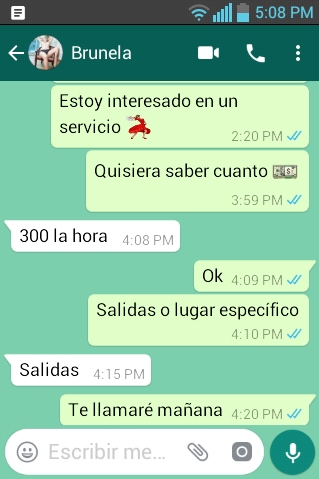A Pimp Talks about the Venezuelan Prostitution Business in Peru
Venezuelan prostitutes are in high demand in Lima. Their pimp speaks candidly about the business.


The economic crisis and high crime rates in Venezuela have forced thousands out of their homeland and, given the alleged advantages that the Peruvian government offers Venezuelan immigrants, such as stay permits and recognition of university degrees, many take the four-day ride to a better future. Although for some the promise comes through in the form of dignified living conditions, many Venezuelans are exploited in 12-hour working shifts, earning minimum wage.
That’s why Anderson Ruiz (not his real name) resorted to unorthodox survival strategies.
“The money comes fast, but it’s hard to hear the girls talk of how much they despise what they do. They’re in need and this is their best option to send money home.”
His work consists on getting a Peruvian client in touch with a Venezuelan woman. That alone is 50 soles, as much as an average working day, in 15 minutes. In turn, the girls charge 300 soles per hour. The operation takes place mostly in well-to-do areas of the Peruvian capital.
According to Anderson, several hotels in the city have special employees charged with letting pimps know if any new Venezuelan women have arrived so they can make their proposals. There are even nascent businesses around prostitution, such as renting furnished apartments specifically for Venezuelan women.
“So you have Peruvian friends who understand the situation of Venezuelan women and ask you whether one of them would like to earn some extra money. They always ask you about it.”
Peruvian friends understand the situation of Venezuelan women and ask you whether one of them would like to earn some extra money.
Anderson travelled from Aragua de Barcelona to Lima on the first week of December 2017, with a suitcase full of ideas and enthusiasm. He’s an industrial security technician, and he worked on that for several years in a prestigious Venezuelan company. His first job in Peru was as a bearer in a shipping company: he unloaded containers from 9:00 a.m. to 9:00 p.m. every day. He got tired of the routine in a month and resigned.
In recent months, Peruvian news have been filled with stories of native citizens being laid off in favor of Venezuelans. There are even job offers exclusively for Venezuelans, because employers can save money in terms of wages and labor benefits. Anderson had messy living conditions, he slept on the floor in a gym where a friend of his worked.
He currently lives in a hostel along with many of his countrymen. Noticing that men cruised through women’s quarters several times a day, he started talking to them and confirmed they were working as prostitutes — and thus his business came to be.
Anderson says that the business is profitable thanks to the physical traits of Venezuelan women. His phone is always ringing and his wallet’s filling up. The customers tend to be businessmen living in the capital; he describes a recent case, that of Ámbar, a friend of his who’s been in Peru for several months. She needed $1,000 to bring her daughter from Caracas, but she couldn’t afford that with her previous job on a basic salary barely covering daily expenses, transport, food and rent. She would send whatever money she had left after that to her family.
The meeting was set for the day following my message and it was just this simple: Anderson gave me her number, I sent her a text to set the appointment.
A hostel employee approached her offering 300 soles for an hour of pleasure. Ámbar found herself on a tight spot. Eventually, he became her first customer, and monetary benefits were evident immediately.
Anderson was “her agent.” He helped her with photoshoots and arranged a few contracts. When he talks about new customers, her sadness is evident. Meanwhile, Ruiz doesn’t see any chances of finding a better job where his rights are respected — but he doesn’t refuse the earnings produced by his mediation.
With the money he gets, he helps his family, who ignores the origin of the money, and he’s been paying off what he had to borrow to leave Venezuela.
Like any fixer, he sends customers a link to a website (not safe for work, explicit images), so they can pick the woman they want. That’s how I got in touch with Brunela, identified with a Venezuelan flag in the webpage. She charges 300 soles an hour, available between Monday and Sunday, only for dates in the Lima district.
Her reply was laconic, straight to the point. The meeting was set for the day following my message and it was just this simple: Anderson gave me her number, I sent her a text to set the appointment, as in any other transaction.
There are currently seven Venezuelans offering their escort services on the website.
“The families of many women here have no clue of what they’re doing for a living. One of them has a husband and a daughter in Trinidad & Tobago and they’ll soon arrive [in Lima]. She still hasn’t figured out how to tell them.”
Caracas Chronicles is 100% reader-supported.
We’ve been able to hang on for 22 years in one of the craziest media landscapes in the world. We’ve seen different media outlets in Venezuela (and abroad) closing shop, something we’re looking to avoid at all costs. Your collaboration goes a long way in helping us weather the storm.
Donate





